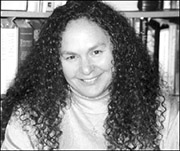OutLoud: To the Extreme
Sally ponders how gay in public is really okay
I walked into the Counseling Psychology class, overhead fluorescents glinting off my rainbow pin. I’d been invited as a sort of show and tell, a living example of queerdom. Glad to do my part.
My own coming out was prompted by another gay panel that visited our Women’s Studies class back in 1973. Until then, I had considered homosexuality strictly academic—a few paragraphs under deviance in our psychology text. But one woman’s open attitude and ease in saying “I am a lesbian” to a class of us clueless sophomores radically shifted my dominant paradigm. I’ve happily identified as a big queer ever since.
There I was, sitting in front of a semicircle of a dozen school nurses, teachers, and principals, all pursuing their counseling certificates. The panel was just two of us, a PFLAG dad and me. We were there to help these soon-to-be school counselors develop their cultural competency on LGBTQ issues. What a gig.
The classroom looked bright and updated. I hoped the students were too. But, as it turned out, not so much.
The students leaned forward in their desk chairs and made eye contact—at least they had good active listening skills. The PFLAG dad told his story of learning to accept and be proud of his lesbian daughter. I related my tale of coming out to unaccepting parents. The students seemed genuinely empathetic.
One burly guy—a principal at a small-town high school—asked the first question. “I have no problem with the gays I know, but what about these parades where some are too, too . . .”
“Extreme?” the matronly middle-school teacher next to him suggested.
The other students nodded like counselors.
“Extreme?” I felt my face flush. Too bad this wasn’t a class on righteous queer indignation. I’d love to sit on that panel. Instead, I curtailed my urge to spontaneously combust. I pointed out to the class that considering some LGBTQ people too extreme is an unhelpful bias. Not that only hets have it. The argument over how gay it’s okay to be in public gets our queer knickers in a knot, too.
I explained that extreme queers happen to be my heroes. If it hadn’t been for the extreme dykes, fags, and trannies at Stonewall, would this class even be having a gay panel? Isn’t learning to accept and express your full self what counseling is all about? My eyes started to well up.
A stunned silence hung in the air. In the face of ignorance, what can we do but show up and tell the truth? I had to trust that at least some of these adult students got it, the way I did when that gay panel talked to my class in 1973. Now it’s our homo civic duty to let the under-exposed know they’re swimming in the mainstream with all kinds of people, including us queers.
Good counselors encourage you to express your whole self wherever you are. And for godsake, be extreme.
Sally Sheklow received both first- and second-place honors in the magazine column category in the 2005 Houston Press Club Lone Star Awards. She contributes a regular segment, “That Time of the Month,” to the Air America radio affiliate in Eugene, Oregon.











